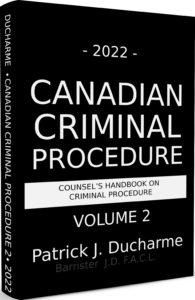 |
| Patrick Ducharme |
One of the pre-requisites to admissibility of evidence under this exception is that the acts or declarations are performed in furtherance of the conspiracy or agreement. Chang referred to the “in furtherance requirement” as imbuing “co-conspirators’ declarations with res gestae type qualities.” It referred to “in furtherance declarations” as “the very acts by which the conspiracy is formulated or implemented and are made in the course of the commission of the offence.”1 They are part of the res gestae in the execution of the plan of the agreement.
Continue reading ““In Furtherance” Requirement”



